
Navigating the aftermath of a car accident can feel overwhelming, especially when dealing with Florida’s unique laws and compensation rules. For victims, understanding their rights and the legal framework in 2025 is crucial to securing fair compensation and holding at-fault parties accountable.
Florida’s no-fault insurance system, evolving legal updates, and specific deadlines can make the claims process complex. Victims need clarity on what steps to take, what compensation they may be entitled to, and how to protect their interests effectively. This guide breaks down the essentials to help accident victims confidently move forward.
Understanding No-Fault Insurance in Florida in 2025
Florida continues to operate under a no-fault insurance system in 2025. This system requires all drivers to carry Personal Injury Protection (PIP) coverage, which provides up to $10,000 for medical expenses and lost wages regardless of fault. Victims can only pursue compensation from the at-fault driver if their injuries meet specific thresholds, such as significant or permanent impairment.
PIP benefits cover necessary medical treatments, including diagnostic services, surgeries, and rehabilitation. Policyholders must seek initial treatment within 14 days of the accident to qualify for coverage. If this condition isn’t met, benefits may be denied.
While PIP simplifies access to immediate funds after an accident, it doesn’t cover non-economic damages like pain and suffering. Victims meeting the injury threshold may pursue additional compensation beyond PIP limits by filing a personal injury lawsuit against the at-fault driver. Florida car accident lawyers, such as Michles & Booth, P.A., can help victims understand their rights and evaluate claim options.
Changes in Florida’s insurance laws continue to impact claim processes and settlement timelines in 2025. Staying informed and working with experienced attorneys are essential steps in navigating these complexities.
Key Steps to Take After a Car Accident
- Ensure Safety at the Scene
Assess the situation and move to a safe location if possible. Contact emergency services immediately to report the accident, especially if there are injuries or significant damage. - Document the Accident
Take photos of the vehicles, any visible injuries, and the surrounding area. Collect details from all parties involved, including names, contact information, and insurance details. Record the date, time, and weather conditions. - Seek Medical Attention
Consult a healthcare provider even if injuries seem minor. Florida’s no-fault insurance system requires victims to seek initial treatment within 14 days to qualify for Personal Injury Protection (PIP) benefits. - Notify Insurance Providers
Report the accident to your insurance company promptly. Provide accurate information, but avoid accepting fault or making speculative statements about the incident. - Consult a Florida Car Accident Lawyer
Engage with legal professionals to understand your rights and evaluate potential claims. Attorneys, like those from Michles & Booth, P.A., can assist in navigating Florida’s evolving car accident laws and pursuing just compensation. - Maintain All Relevant Records
Keep copies of medical bills, repair estimates, and correspondence with insurance companies. Retain incident reports and other documents that support a potential claim. - Avoid Discussing the Case Publicly
Refrain from sharing accident-related details on social media or with unauthorized parties. Public statements can potentially be used against your claim.
Determining Fault and Liability in Florida Car Crashes
Florida follows a no-fault insurance structure, but determining fault is essential when injuries surpass the threshold for filing personal injury lawsuits. To pursue claims against an at-fault driver, victims must establish negligence, causation, and damages. Negligence arises when a driver fails to act with reasonable care, such as by speeding, texting, or disregarding traffic laws. Evidence like police reports, eyewitness accounts, and video footage can strengthen fault claims.
Comparative negligence applies in these cases. Florida operates under a modified comparative negligence system in 2025, preventing recovery if a victim is over 50% at fault. Compensation is reduced by the victim’s percentage of fault, making accurate liability assessments crucial.
Insurance companies often challenge fault determinations. Legal professionals, including Florida Car Accident Lawyers and firms like Michles & Booth, P.A., evaluate evidence, handle insurance disputes, and safeguard victims’ claims. Partnering with experienced attorneys ensures victims accurately assign liability and receive rightful compensation under Florida law.

Updated Compensation Limits for Car Accident Victims
In 2025, Florida’s compensation framework for car accident victims reflects specific adjustments under its no-fault system. Personal Injury Protection (PIP) coverage remains mandatory, providing up to $10,000 for immediate medical expenses and lost wages regardless of fault. However, for injuries surpassing Florida’s serious injury threshold—like significant disfigurement or permanent loss of bodily function—victims may pursue additional damages through a personal injury lawsuit.
Economic damages, such as medical expenses, rehabilitation costs, and lost income beyond PIP’s limit, are recoverable through claims against the at-fault party. Non-economic damages, including pain and suffering, emotional distress, and loss of enjoyment of life, are only available if the injury threshold is met. Caps on non-economic damages do not apply to car accident claims, but compensation is subject to liability laws and the victim’s percentage of fault.
Florida’s modified comparative negligence rule, updated for 2025, requires victims to be 50% or less at fault to recover compensation. If a victim shares fault, the award decreases proportionally. These regulations emphasize precise documentation and legal advocacy when pursuing claims. Working with experienced Florida car accident lawyers, such as those from Michles & Booth, P.A., ensures victims navigate the process effectively.
How Comparative Negligence Affects Your Claim
Florida applies a modified comparative negligence system in 2025. This rule allows car accident victims to recover compensation only if their percentage of fault is 50% or less. Compensation decreases proportionally to the degree of fault assigned. For example, if a victim is found 20% at fault, their total compensation is reduced by 20%.
Victims bear the burden of establishing their lack of negligence to strengthen their claims. Evidence like photographs, witness statements, and police reports can help minimize fault attribution. Insurance companies often exploit this law, attempting to attribute higher fault percentages to reduce payouts. Legal professionals, including Florida car accident lawyers like those at Michles & Booth, P.A., assist victims by challenging unfair fault determinations and maximizing compensation.
Shared fault scenarios can complicate claims. In multi-vehicle collisions, victims must clearly demonstrate the other parties’ roles in causing the accident to avoid excessive fault allocation. An accurate liability assessment supported by robust evidence is vital under Florida’s comparative negligence law.
Gathering Evidence: Photos, Police Reports, and Witness Statements
Evidence provides the foundation for any car accident claim in Florida. Photos, police reports, and witness statements help establish the sequence of events and support fault determinations.
Photos
Accident scene photos capture crucial details. Include images of vehicle damage, road conditions, traffic signs, skid marks, and injuries. Take these photographs immediately after the accident, if possible, to ensure accuracy. Multiple angles provide a comprehensive view and facilitate clear evidence presentation.
Police Reports
Police officers document accidents through official reports, which often include diagrams, initial fault assessments, and citations, if issued. These reports offer critical third-party validation of accident details. Victims should request a copy from the law enforcement agency handling the incident to strengthen their claims.
Witness Statements
Eyewitness statements add credibility to accident accounts. Individuals who observed the crash can provide unbiased descriptions of events, especially if fault is disputed. Collect contact information promptly to ensure accessibility during legal or insurance proceedings.
A car accident victim benefits significantly from legal advice to gather and use evidence effectively. Florida car accident lawyers, such as those at Michles & Booth, P.A., can guide victims in presenting compelling evidence for their claims under Florida’s evolving 2025 legal framework.
Working with Insurance Adjusters to Maximize Settlements
Insurance adjusters evaluate claims based on provided evidence, policy details, and liability. Clear and accurate communication with adjusters enhances settlement outcomes. Victims should provide comprehensive documentation, including medical records, repair estimates, and police reports, to validate claims effectively.
Negotiations often require vigilance, as insurance companies aim to minimize payouts. Adjusters may offer lower initial settlements, emphasizing policy limits or disputing injury severity. Victims benefit from consulting Florida car accident lawyers, like those at Michles & Booth, P.A., to identify fair compensation and counter inadequate offers.
Recorded statements to adjusters may be used against victims if inconsistencies arise. Sharing facts without admitting fault or providing speculative details protects potential compensation. Professional legal guidance ensures statements align with claim objectives.
Accurate demand letters clearly outline damages, including medical expenses, lost earnings, and non-economic losses, like pain and suffering. Itemized lists supported by evidence strengthen negotiations with insurance adjusters. In complex cases, legal representatives with experience in Florida’s 2025 laws handle negotiations to secure higher settlements.
Understanding Florida’s Statute of Limitations for Car Accidents
Florida law enforces a statute of limitations for filing car accident lawsuits. Victims generally have two years from the accident date to file a personal injury lawsuit. For wrongful death cases, the two-year period begins on the date of the victim’s death. If a claim is not filed within the specified timeframe, courts typically dismiss the case.
Exceptions to the statute of limitations may apply under specific circumstances. For instance, if a victim is incapacitated immediately after the accident, the timeframe may extend until the incapacity ends. Similarly, if the at-fault party leaves Florida after the accident without providing a valid contact address, the statute’s countdown may pause until their return.
Meeting the statute of limitations is crucial for preserving legal rights to seek compensation. Michles & Booth, P.A., and other Florida car accident lawyers can help victims evaluate timelines, prepare necessary documentation, and ensure compliance with filing deadlines. Missing these deadlines may result in losing the chance to pursue damages, making early legal consultation essential.
Pursuing Legal Action Against Negligent Drivers
Victims of car accidents caused by negligent drivers may seek damages beyond the limits of no-fault insurance if their injuries meet Florida’s serious injury threshold in 2025. To take legal action, victims must demonstrate that the at-fault driver breached their duty of care, directly causing injuries and related damages. Evidence such as police reports, eyewitness statements, and accident scene photos strengthens these claims.
Filing a personal injury lawsuit enables recovery of economic damages like medical costs and lost income, as well as non-economic damages like pain and suffering if the injury is significant or permanent. Florida’s 2025 legal framework, including modified comparative negligence, requires victims to prove they are 50% or less at fault, reducing compensation proportionate to shared fault.
Professional legal support is critical to navigating these complexities. Florida car accident lawyers, including firms like Michles & Booth, P.A., assist in building convincing cases, gathering evidence, and negotiating with responsible parties. Their expertise ensures victims leverage all available options under Florida law to secure maximum compensation.
Tips for Navigating Uninsured and Underinsured Motorist Claims
Understanding Florida’s car accident laws and compensation framework is essential for protecting your rights as a victim. Navigating uninsured and underinsured motorist claims requires vigilance, thorough documentation, and professional guidance. Victims should review their insurance policies to confirm coverage and promptly report incidents to their providers.
When dealing with uninsured or underinsured drivers, gathering strong evidence like police reports, photos, and witness statements is critical. These claims often involve disputes, making legal representation invaluable to ensure fair compensation. Consulting experienced Florida car accident attorneys can help victims assess their options, negotiate with insurers, and pursue additional damages when necessary.
By staying informed and proactive, car accident victims can better manage the complexities of Florida’s evolving legal landscape in 2025. With the right approach and support, they can secure the compensation they deserve while holding negligent parties accountable.
